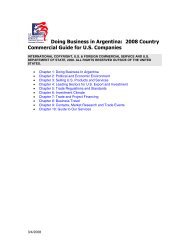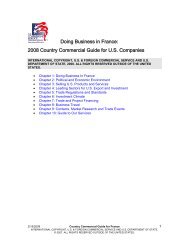Doing Business In Saudi Arabia - Bna
Doing Business In Saudi Arabia - Bna
Doing Business In Saudi Arabia - Bna
Create successful ePaper yourself
Turn your PDF publications into a flip-book with our unique Google optimized e-Paper software.
Prospective foreign investors want standardized treatment for corporate taxes, access<br />
to a skilled, motivated labor force, the consistent enforcement of foreign arbitration<br />
awards, a clear and transparent mechanism to reduce and stop counterfeit products<br />
from entering <strong>Saudi</strong> <strong>Arabia</strong>, and the protection of intellectual property rights that meets<br />
international standards.<br />
The foreign direct investment law, revised in 2000, permits foreigners to invest in all<br />
sectors of the economy, except for specific activities contained in a “negative list” that<br />
are off limits to foreign investors. This list continues to shrink as <strong>Saudi</strong> <strong>Arabia</strong> attempts<br />
to liberalize trade. Foreign investors are no longer required to take local partners in<br />
many sectors and may own real estate for company activities. They are allowed to<br />
transfer money from their enterprises outside of the country and can sponsor foreign<br />
employees. Minimum capital requirements to establish business entities have<br />
generally been eliminated other than capitalization requirements to which <strong>Saudi</strong> <strong>Arabia</strong><br />
committed during its accession to the WTO in specific services, such as for insurance<br />
companies.<br />
<strong>In</strong> April 2000, the Council of Ministers established the <strong>Saudi</strong> <strong>Arabia</strong>n General<br />
<strong>In</strong>vestment Authority (SAGIA) to provide information and assistance to foreign<br />
investors, and to foster investment opportunities in energy, transportation, and<br />
knowledge-based industries (See www.sagia.gov.sa). SAGIA operates under the<br />
umbrella of the Supreme Economic Council, and is headed by SAGIA Governor Amr<br />
Al Dabbagh. SAGIA’s duties include formulating government policies regarding<br />
investment activities; proposing plans and regulations to enhance the investment<br />
climate in the country; and evaluating and licensing investment proposals. All foreign<br />
investment projects must obtain a license from SAGIA. Local investors continue to<br />
apply to the Ministry of Commerce and <strong>In</strong>dustry for licenses, and investments in<br />
specific sectors may require licenses from other government authorities, including, but<br />
not limited to, the <strong>Saudi</strong> <strong>Arabia</strong>n Monetary Agency (SAMA), the Capital Market<br />
Authority or the Communications and <strong>In</strong>formation Technology Commission.<br />
SAGIA set up an <strong>In</strong>vestor's Service Center (ISC) to provide licenses to foreign<br />
companies, provide support services to investment projects, offer detailed information<br />
on the investment process, and coordinate with government ministries in order to<br />
facilitate investment procedures. The ISC must decide to grant or refuse a license<br />
within 30 days of receiving an application and supporting documentation from the<br />
investor. <strong>In</strong> 2007, SAGIA licensed 1,483 joint and foreign investment projects worth a<br />
total of $89 billion. The value of projects licensed increased by 33 percent from the<br />
previous year. Actual foreign direct investments inflows, however, were limited to<br />
about $18 billion.<br />
Unfortunately, to date SAGIA does not appear to have lived up to the high<br />
expectations engendered by its creation. <strong>In</strong>vestors complain that impediments remain,<br />
many outside SAGIA’s capability to correct. SAGIA has agreements with various<br />
<strong>Saudi</strong> government agencies and ministries to facilitate and streamline foreign<br />
investment procedures. Some of these agreements include facilitating entry visas,<br />
establishing SAGIA branch offices at <strong>Saudi</strong> Embassies in different countries,<br />
facilitating the issuance of workers’ visas, raising import tariff exemptions on raw<br />
materials to three years and increasing the exemptions on production and<br />
manufacturing equipment to two years, and the establishment of commercial courts.<br />
SAGIA opened a Women’s <strong>In</strong>vestment Center in spring 2003.<br />
5/13/2008












